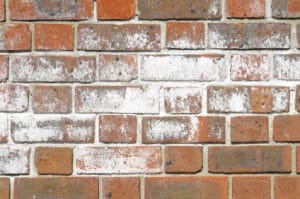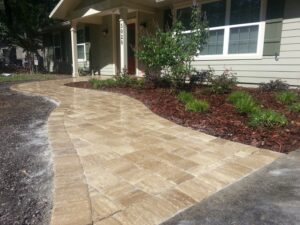Why Should I Seal My Pavers?
Home » Why Should I Seal My Pavers?
When you invest in something beautiful, you want to protect it. That’s why you put the car in the garage and treasured photographs in frames. The same applies to your beautiful, hardscape outdoor living space.
After all your hard work designing your dream walkway, patio, or pool deck, it is important to protect it from both the elements and the accidents of life. Properly done, paver sealing prevents keeps moisture out, prevents efflorescence, and holds sand joints in place, making your pavers look like new for many years to come.
The Benefits of Paver Sealing
Aesthetics
 Properly sealing pavers is your best defense against efflorescence. When porous surfaces like brick and concrete are exposed to moisture, the salt and solvents contained in the material migrate to the surface forming a white cloudy coating, commonly referred to as efflorescence. Sealing your pavers with a water-based sealer limits the amount of moisture inside each paver, effectively preventing efflorescence.
Properly sealing pavers is your best defense against efflorescence. When porous surfaces like brick and concrete are exposed to moisture, the salt and solvents contained in the material migrate to the surface forming a white cloudy coating, commonly referred to as efflorescence. Sealing your pavers with a water-based sealer limits the amount of moisture inside each paver, effectively preventing efflorescence. Joint Stabilization
Sealing pavers helps stabilize and harden the sand joints holding the pavers in place, which prevents loosening and cracking over time. Some settling and shifting are inevitable, especially in the sandy soil here in Gainesville, FL. However, installing pavers over crushed gravel or concrete substrate, combined with proper sealing techniques, will significantly minimize any shifting of your pavers.
Additionally, sealing the sand joints between your pavers prevents grass and weeds from growing up between them. This not only saves your back from weeding, it also keeps your hardscape surface smooth and level.
Protects from Stains
 You’ve already undertaken the investment of adding a beautiful hardscape outdoor living area, the last thing you want is for those pavers to be damaged in the act of enjoying your new space. Highly trafficked areas need a little extra protection from the messes of life. Patios and outdoor kitchens are vulnerable to wine or juice stains, oils and fats from the grill, or pet accidents. Your driveway is a magnet for spots created from oil drips and other car fluids. A water-based sealer repels even the toughest of stains and protects your pavers from everything your busy lifestyle throws at them.
You’ve already undertaken the investment of adding a beautiful hardscape outdoor living area, the last thing you want is for those pavers to be damaged in the act of enjoying your new space. Highly trafficked areas need a little extra protection from the messes of life. Patios and outdoor kitchens are vulnerable to wine or juice stains, oils and fats from the grill, or pet accidents. Your driveway is a magnet for spots created from oil drips and other car fluids. A water-based sealer repels even the toughest of stains and protects your pavers from everything your busy lifestyle throws at them.
Easier Cleaning & Maintenance
In addition to repelling stains, sealed pavers are significantly easier to clean than their unsealed counterparts. In most cases, a simple spray down with the hose or small pressure washer is all it takes to keep your pavers looking as fresh and new as the day they were installed.
How to Properly Seal Pavers
- Always hire a true professional to seal your pavers. Pavers need to be properly cleaned and prepped before being carefully sealed. All the sand joints need to be in good working order before the sealer is applied. If any steps are skipped, you will end up spending big money to fix the problem down the line.
- Beware of any service that sounds too good to be true. Many well-meaning handymen will pick up a product from the nearest big box store and these are all most certainly going to fail. They cloud, bubble, peel, and flake, not to mention the headache cheap sealers will cause when you attempt to strip and remove them.
- Use a water-based sealer that allows moisture to pass through the paver to most effectively prevent efflorescence. Water-based sealers are penetrating sealers as opposed to oil-based topical sealers. Water-based sealers penetrate the top layer of each paver creating a moisture barrier just below the surface, rather than the slick gloss of a topical sealer.
- Using a water-based sealer is especially important around pools where there is a lot of moisture that can cause pavers to become slick. Pavers sealed with water-based products retain their grip and are much safer under wet conditions.
- Wait an appropriate amount of time before sealing your pavers. It is important to let your new pavers settle into position before sealing them. This prevents unnecessary cracking down the road. Additionally, some initial efflorescence will occur in all concrete and brick pavers when they are first installed and exposed to moisture. Leaving time before sealing your pavers allows this process to resolve itself and prevents this natural efflorescence from collecting below your sealer.
- Don’t over apply the sealer. In paver sealing, more does not equal better. Water-based sealers should be applied in thin coats. Too much sealer will prevent the concrete blocks from breathing and trap moisture in the stones, leading to cloudy and unsightly pavers.
- Seal pavers every 3-5 years for best results.
